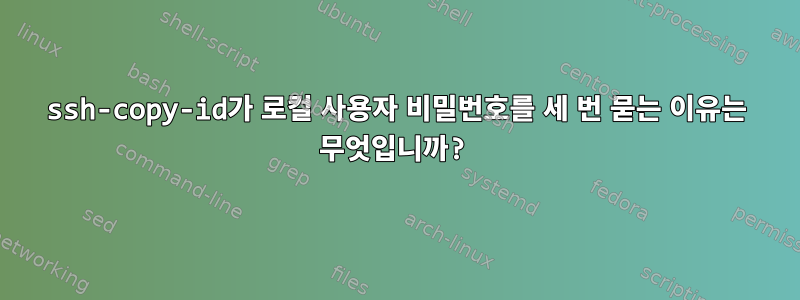
내가 눈치 챈 것에서이전 질문SSH 공개 키를 원격 호스트에 복사하려고 하면 ssh-copy-id로컬 사용자 비밀번호를 입력하라는 메시지가 3번 나타납니다.
ssh-copy-id myuser@myserver
Password:
Password:
Password:
myuser@myserver's password:
로컬 사용자 비밀번호를 입력하라는 메시지가 세 번 나타나는 이유는 무엇입니까? 이것이 예상되는 동작입니까? 또한, 무대 뒤에서 무슨 일이 벌어지고 있는 걸까요?
편집하다: 사용하면 ssh로컬 사용자 비밀번호를 묻는 메시지가 표시되지 않습니다. 내 로컬 비밀번호는 내 노트북의 일반 Linux 비밀번호이고 원격 컴퓨터는 동일한 열기 방법을 통해 Active Directory 도메인에 연결된 Ubuntu 상자(11.10)입니다. myuser사실 내 역할 에서 벗어나는 mydomain\myuser이나 의 경우도 마찬가지다 .[email protected]\이전 질문..원격 머신 /etc/ssh/sshd_config파일은 다음과 같습니다:
# Package generated configuration file
# See the sshd_config(5) manpage for details
# What ports, IPs and protocols we listen for
Port 22
# Use these options to restrict which interfaces/protocols sshd will bind to
#ListenAddress ::
#ListenAddress 0.0.0.0
Protocol 2
# HostKeys for protocol version 2
HostKey /etc/ssh/ssh_host_rsa_key
HostKey /etc/ssh/ssh_host_dsa_key
HostKey /etc/ssh/ssh_host_ecdsa_key
#Privilege Separation is turned on for security
UsePrivilegeSeparation yes
# Lifetime and size of ephemeral version 1 server key
KeyRegenerationInterval 3600
ServerKeyBits 768
# Logging
SyslogFacility AUTH
LogLevel INFO
# Authentication:
LoginGraceTime 120
PermitRootLogin yes
StrictModes yes
RSAAuthentication yes
PubkeyAuthentication yes
#AuthorizedKeysFile %h/.ssh/authorized_keys
# Don't read the user's ~/.rhosts and ~/.shosts files
IgnoreRhosts yes
# For this to work you will also need host keys in /etc/ssh_known_hosts
RhostsRSAAuthentication no
# similar for protocol version 2
HostbasedAuthentication no
# Uncomment if you don't trust ~/.ssh/known_hosts for RhostsRSAAuthentication
#IgnoreUserKnownHosts yes
# To enable empty passwords, change to yes (NOT RECOMMENDED)
PermitEmptyPasswords no
# Change to yes to enable challenge-response passwords (beware issues with
# some PAM modules and threads)
#Overwritten by lwidentity: ChallengeResponseAuthentication no
ChallengeResponseAuthentication yes
# Change to no to disable tunnelled clear text passwords
#PasswordAuthentication yes
# Kerberos options
#KerberosAuthentication no
#KerberosGetAFSToken no
#KerberosOrLocalPasswd yes
#KerberosTicketCleanup yes
# GSSAPI options
#GSSAPIAuthentication no
GSSAPIAuthentication yes
#GSSAPICleanupCredentials yes
GSSAPICleanupCredentials yes
X11Forwarding yes
X11DisplayOffset 10
PrintMotd no
PrintLastLog yes
TCPKeepAlive yes
#UseLogin no
#MaxStartups 10:30:60
#Banner /etc/issue.net
# Allow client to pass locale environment variables
AcceptEnv LANG LC_*
Subsystem sftp /usr/lib/openssh/sftp-server
# Set this to 'yes' to enable PAM authentication, account processing,
# and session processing. If this is enabled, PAM authentication will
# be allowed through the ChallengeResponseAuthentication and
# PasswordAuthentication. Depending on your PAM configuration,
# PAM authentication via ChallengeResponseAuthentication may bypass
# the setting of "PermitRootLogin without-password".
# If you just want the PAM account and session checks to run without
# PAM authentication, then enable this but set PasswordAuthentication
# and ChallengeResponseAuthentication to 'no'.
UsePAM yes
KbdInteractiveAuthentication yes
답변1
ssh-copy-id다음 단계를 수행하는 래퍼 셸 스크립트입니다.
- SSH 에이전트와 대화하여 사용 가능한 키를 찾는 공개 키를 찾으세요.
- 다른 SSH 클라이언트처럼 원격 서버에 로그인하세요.
- 하나 이상의 공개 키를 파일로 원격 서버에 복사합니다
.ssh/authorized_keys. 여기에는 디렉토리가 없고 올바른 권한이 있는 경우 디렉토리 생성도 포함됩니다.
당신은 그것이 무엇을 하는지 직접 보기 위해 읽을 수 있습니다 /usr/bin/ssh-copy-id. 파일을 복사하고 코드에 디버깅을 추가하여 실행 중에 어떤 일이 발생하는지, 변수 값이 무엇인지 확인하세요.


